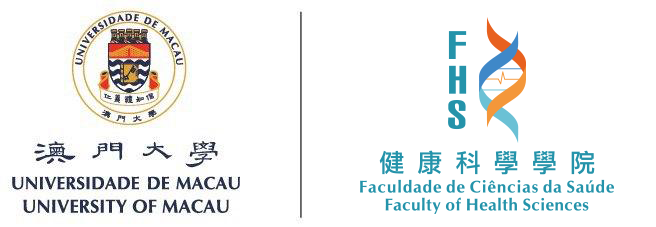
Mon 10:00 – 11:00, Wed 16:00 – 17:00
| Name | Position | Office | Phone | |
|---|---|---|---|---|
| Eun Ju YANG | Research Assistant (Lab Representative) | N22-2027 | +853 8822 4217 | ejyang@um.edu.mo |
| Minhong LYU | PhD Student | yc57667@um.edu.mo | ||
| Tianjiao SHAN | PhD Student | N22-2027 | +853 8822 4217 | |
| Xianzhuo ZHANG | PhD Student | N22-2027 | +853 8822 4217 | |
| Xiaoxuan SUN | PhD Student | N22-2027 | +853 8822 4217 | |
| Xin SHEN | PhD Student | N22-2027 | +853 8822 4217 | |
| Lijie CHEN | PhD Student | N22-2027 | +853 8822 4217 | |
| Xiumei ZHANG | PhD Student | N22-2027 | +853 8822 4217 |
| Education | |
| DEng | Dept. Bioscience & Biotechnology, Sejong University, Korea (2000-2004) |
| MSc | Dept. Applied Biology, Dongguk University, Korea (1998-2000) |
| BSc | Dept. Biology, Dongguk University, Korea (1990-1998) |
| Positions | |
| 2019 – Present | Associate Professor, Faculty of Health Sciences, University of Macau |
| 2013 – 2019 | Assistant Professor, Faculty of Health Sciences, University of Macau |
| 2011 – 2013 | Research Associate, Dept. Pharmacology & Molecular Sciences, Johns Hopkins School of Medicine, Baltimore, MD, USA |
| 2006 – 2011 | Postdoctoral Fellow, Dept. Pharmacology & Molecular Sciences, Johns Hopkins School of Medicine, Baltimore, MD, USA |
| 2005 – 2006 | Research Scientist, Biotechnology Industrialization Institute, Yonsei University, Seoul, Korea |
| 2004 – 2005 | Lecturer, Dept. Bioscience & Biotechnology, Sejong University, Seoul, Korea |
| 2000 – 2001 | Research Assistant, Dept. Bioscience & Biotechnology, Sejong University, Seoul, Korea |
| Research Interests |
|
[Exploiting synthetic lethality for cancer precision medicine] Synthetic lethality is a genetic interaction where a single gene deficiency is tolerable for cell viability while the combination of deficiencies in two genes leads to cell death. The concept of the synthetic lethality has been widely exploited in cancer research field because a large portion of cancer has loss-of-function mutations in tumor suppressor genes. Synthetic lethality utilizes the mutations in tumor suppressor genes as a mark for selectivity of anticancer drugs. Pharmacological or genetic perturbation of a synthetic lethality partner of a tumor suppressor will cause selective lethality of the cancer cells that carry the tumor suppressor mutation. As it provides a strong cancer cell selectivity, synthetic lethality is one of core approaches for cancer precision medicine.
My lab is studying major tumor suppressor genes, including p53, PTEN, RB1, BRCA1, ARID1A, and SMAD4, and is expanding to newly identified tumor suppressors. We have established isogenic cell pairs for the tumor suppressor genes and actively working on identifying synthetic lethality partners using chemical and genetic screenings. |
| Representative Publications |
|
| Full publications list |
| Research Grants | |
| 2024 – 2027 | FDCT-NSFC Joint Grant (FDCT-0139-2024-AFJ): Development and mechanistic study of immune-sensitizing drugs targeting tumor gene mutations. |
| 2025 – 2026 | UM Multi-Year Research Grant (MYRG-GRG2024-00056-FHS): Therapeutic targeting of RB1 biallelic loss for the development of biomarker-driven targeted therapy for hepatocellular carcinoma. |
| 2024 – 2025 | UM Multi-Year Research Grant (MYRG-GRG2023-00124-FHS-UMDF): Discovery of SKP2 inhibitor as a precision cancer medicine for VHL-deficient renal cell carcinoma. |
| 2023 – 2026 | Shenzhen Science and Technology Innovation Commission (SZSTIC) Shenzhen-Hong Kong-Macao Science and Technology Project (EF2023-00070-FHS): FHIT合成致死原理在肺癌精准治疗中的应用. |
| 2022 – 2025 | Macau Science and Technology Development Fund (FDCT-0049-2022-A): Targeting DNA methyltransferases (DNMT) in von-Hippel Lindau (VHL)-deficient renal cell carcinoma. |
| 2022 – 2023 | UM Multi-Year Research Grant (MYRG2020-00229-FHS): AURKA, a precision drug target for SMAD4-mutant colorectal cancer. |
| 2020 – 2022 | Macau Science and Technology Development Fund (FDCT-0107-2020-A): Bromodomain and Extraterminal motif (BET) as a precision cancer target for SMAD4-deficient colorectal cancer. |
| 2020 – 2021 | Macau Science and Technology Development Fund (FDCT-0030-2020-A): Drug repurposing approach for the rapid discovery of therapeutics for SARS-CoV-2 infection. |
| 2020 – 2022 | UM Multi-Year Research Grant (MYRG2019-00116-FHS): Therapeutic targeting of RB1 tumor suppressor mutation in lung cancer cells by aurora kinase A inhibition. |
| 2017 – 2020 | UM Multi-Year Research Grant (MYRG2017-00176-FHS): Targeted inhibition of ARID1A-deficient colorectal cancer cells by synthetic lethality. |
| 2015 – 2018 | Macau Science and Technology Development Fund (FDCT-024-2015-A1): Development of drugs targeting mitochondria to inhibit castration-resistant prostate cancer. |
| 2015 – 2018 | UM Multi-Year Research Grant (MYRG2015-00181-FHS): Discovery of synthetic lethal microRNA to the tumor suppressor PTEN and its application for targeted cancer therapy. |
| 2014 – 2017 | UM Matching Research Grant (MRG002-JSS-2015-FHS): Discovery of novel anti-angiogenic and anticancer agents from a clinical drug library. |
| 2014 – 2017 | Macau Science and Technology Development Fund (FDCT-119-2013-A3): Discovery of novel anti-angiogenic and anticancer agents from a clinical drug library. |
| 2013 – 2015 | UM Startup Research Grant (SRG2013-00045-FHS): A novel mechanism of angiogenesis inhibition by tamoxifen. |
| Patents |
|
| Awards | |
| 12/2021 | Best Paper Award 2021 in UM-FHS, Macau, China |
| 06/2011 | Young Investigator Award in “2011 KSEA/KASBP Northeast Regional Conference and Bio Fair”, Edison, NJ, USA |
| 05/2004 | Best Poster Award in “The 61st Annual Meeting 2004” of the Korean Society for Biochemistry and Molecular Biology, Seoul, Korea |
| 10/2001 | Best Poster Award in “The Annual Meeting 2001” of the Korean Society for Biochemistry and Molecular Biology, Seoul, Korea |
| Professional Activities | |
| 2022 – present | Editorial Board Member of Pharmaceuticals (MDPI Publisher) |
| 2022 – present | Editorial Board Member of Frontiers in Oncology (Molecular and Cellular Oncology section) |
| 2019 – Present | Editorial Board Member of Molecular Medicine Reports (Spandidos Publication) |
| 2013 – Present | Member of the Korean Society for Biochemistry and Molecular Biology (KSBMB) |
| 2010 – 2019 | Member of the American Chemical Society (ACS) |
| 2015 – 2018 | Member of the Society for Laboratory Automation and Screening (SLAS) |
| 2011 – 2013 | Member of the Korean-American Scientists and Engineers Association (KSEA) |
| 2011 – 2013 | Member of the Korean-American Professional Community in Biotechnology and Pharmaceuticals (KASBP) |
| 2011 – 2012 | Vice President of the Baltimore Life Scientist Association (BLSA) |

